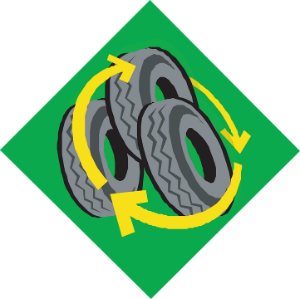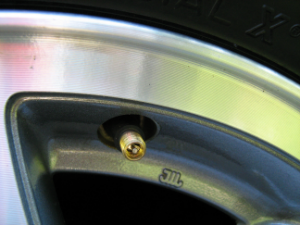Posted on 5/12/2016

When it comes to your car, oil isn't the only thing there's a finite supply of. Rubber has its limits too, and it's estimated by 2020, the supply of natural rubber in the world may be outstripped by demand. And of course, tires require a great deal of oil to produce as well. Tire manufacturers are constantly looking for ways to innovate and conserve resources in tire production. Here are some recent advances: Dandelions: Yes, those humble yellow flowers you try to eliminate from your yard. Dandelions actually contain a minute amount of latex in their milky oil, and research shows they can actually produce about as much latex, pound-for-pound, as rubber plants. German scientists have cultivated 1-foot-tall dandelions for just this purpose. This isn't a new development, either -- in WWII, American companies were growing and cultivating Russian dandelions to cope with rubber scarcities due to wartime conditions. Silica: Tires are a complex blend of many different ingredients. Tires requir ... read more
Posted on 4/28/2016

Tires all look sort of the same…round and black…and people tend to think tires don’t change much over the years. That’s really not true, though – engineers and designers are constantly working on advances in tire designs for more miles, better fuel economy and better performance.Here’s a rundown of current trends in tire technology you may not have been aware of: Tall, skinny tires are coming back. If you’ve ever ridden a beach cruiser bike vs. a racing bike, you know that skinny tires have lower rolling resistance. Carmakers are going in that direction, too – the BMW i3 electric/plug-in hybrid uses Bridgestone Ecopia tires, with higher inflation pressure and a taller, skinnier profile. Tall, skinny tires also reduce the car’s frontal profile for lowered wind resistance and aerodynamic drag. It isn’t just the BMW i3, either…the Corvette Z51 is going with taller, skinnier tires. Static electricity can be a problem with ... read more
Posted on 4/14/2016

If you’re old enough, you probably remember the cars from the late 70s and early 80s that weren’t good for much more than 120,000 miles before they started to develop real problems and were junkyard bound. Today, thanks to improvements in design, metallurgy, manufacturing techniques and machining, those days are over and it’s not at all unusual to see vehicles with well over 200,000 miles on the odometer and still running strong.Here’s a quick rundown of some vehicles to consider which have a track record of being good for 250k miles or more: Toyota Corolla: Probably not a surprise to fans of Toyotas, the simple, no-frills Corolla hasn’t changed much since the early 00s…but Toyota’s approach to the tried-and-true Corolla is, “if it ain’t broke, why fix it?” The Corolla has a reputation for just soldiering on down the road with little need for anything more than routine maintenance. Honda Civic: The Honda counterpart to the Cor ... read more
Posted on 3/31/2016

Driving around on underinflated tires is just a bad idea all the way around. Underinflated tires increase a car’s rolling resistance, meaning a drop in fuel efficiency since it takes more energy to move the vehicle down the road.A single tire that’s down by ten pounds of air means a 3.3 percent drop in fuel economy…multiply that by all four tires, and you can figure on giving up ten percent of your gas mileage. The added friction and rolling resistance also means more heat is generated, and heat is the enemy of the internal structure of a tire. That heat will damage a tire to the point of failure. Studies show that underinflated tires are a full 25 percent more likely to fail, and at least half of one-car accidents involve a tire problem as a factor. And still, it’s estimated that 60 to 80 percent of the vehicles on the road are rolling on tires that are low on air.The tire pressure monitoring systems on newer cars are all well and good, but what can be done to ... read more
Posted on 3/17/2016

Often, drivers are mystified by how their cars actually work. It’s to be expected. Even an older car is a complex machine with many sub-assemblies that all work together to move it down the road.As a result, drivers tend to be a little intimidated by auto repair and often tend to not inform themselves by asking the necessary questions of a tech or a garage. Too often, that ends up being a big mistake. Here are some examples of the kinds of things you really should know before any auto repair work starts: Does your shop work on any kind of vehicle? Of course, most shops can service a product from GM, Ford, Chrysler, Nissan, Toyota and the other leading makes. Some makes, however, require a lot more training and experience, or even factory certifications. Vehicles from Mercedes-Benz, Volvo, BMW and certain other makes often require specialized tools and training; that’s why many towns have repair shops that are for specific makes of vehicles. What kind of equipment does your ... read more